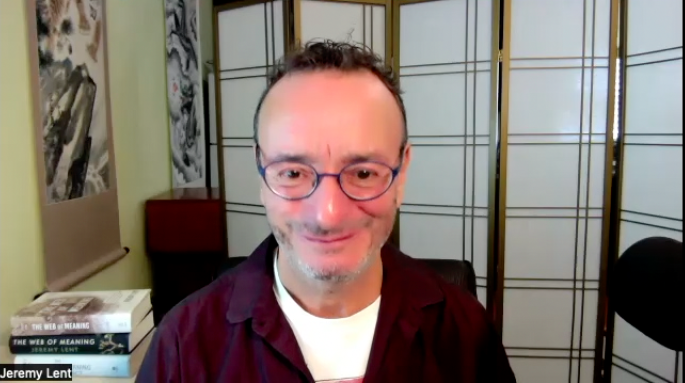From Principles and Practice of Deep Transformation
The last session of Jeremy Lent’s course “Principles and Practice of Deep Transformation” went beyond describing the shift from the worldview that’s causing our ecological catastrophes to the one that we need to move toward. For the first time anywhere I saw a pathway described for how to get from here to there!
Week 10 Session 2, “Pathways to an Ecological Civilization” had three slides that encapsulate the vision.
[Slides used with permission].
The first slide is headed “Scientific Revolution Paradigm Shift”.
The second is headed “The Neoliberal Paradigm Shift”.
And the third one is headed “The Ecological Civilization Paradigm Shift”.
Based on similarities he saw between the first two historic transformations and his case study of the Mont Pelerin Society he projects how we can bring about what he calls The Ecological Civilization Paradigm Shift.
A key is this quote from Milton Friedman, one of the architects of the Neoliberal paradigm shift: “Only a crisis – actual or perceived – produces real change. When that crisis occurs, the actions that are taken depend on the ideas that are lying around. That, I believe, is our basic function: to develop alternatives to existing policies, to keep them alive and available until the politically impossible becomes the politically inevitable.”
So for “A Life-affirming Civilization” what are some of the “ideas lying around”, the core themes of an Ecological Civilization?
Jeremy’s slide lists Rights of nature, Racial and economic justice , Revoke corporate powers, Grassroots democracy, Circular economy, and Permaculture & agroecology, each of which is developed in the course, among several others.
These alternatives to existing policies and systems are being nurtured by tens of thousands of organizations in the political, economic, social, spiritual, indigenous, and many other realms.
Many of these innovations are outside the range of policies politically acceptable in the mainstream right now. As the global crises intensify, as Friedman said, our job is to “develop alternatives to existing policies, to keep them alive and available until the politically impossible becomes the politically inevitable.”
In the course there’s more discussion of how cultural change happens, the rich vision of the Ecological Civilization, and the strategies and tactics for getting there. I’m so inspired by the whole package that I’ve taken the course three times and joined the Deep Transformation Network.
It seems like the perfect place to discuss this vision of a pathway to an Ecological Civilization, refine it and tease out all its implications for action. A small circle could be formed to figure out the best ways to invite the 4000 members to participate.
